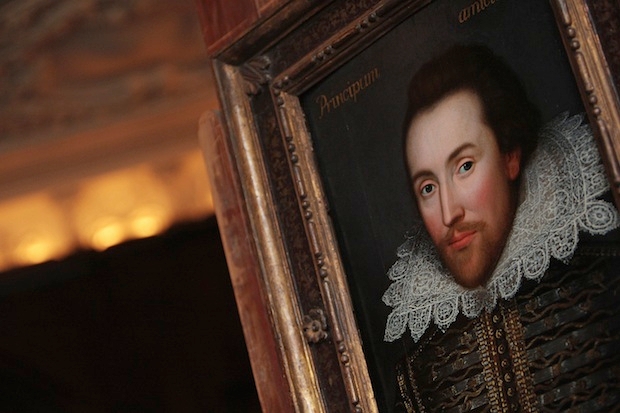The deployment of Shakespeare to describe Brexit is by now a cliché. It might take the form of a quotation, be borrowed in a headline, or involve the name of one of the better-known characters; it might turn up in that most hollow of adjectives, Shakespearean. It has two possible modes. There is triumphalism drawn from the history plays: this sceptred isle, once more unto the breach. And there is tragic calamity: the betrayal by Brutus, Hamlet dithering. Nobody much invokes the comedies, perhaps because negotiations with the EU have not yet descended to cross-dressing.
Shakespeare is our national myth, most useful in a time of crisis, and an amazingly erudite new study by the Shakespeare scholar Jonathan Bate shows that this process of repurposing old stories has always been the point of Shakespeare. As Bate writes in How the Classics Made Shakespeare: ‘Ever since Anglo-Saxon times, the English had told their national stories in histories and legends, frequently drawing on comparisons with antiquity.’
Sixteenth-century England was pre-occupied with the break from Rome, in the turning away of the Reformation English church from the Pope; but it was equally a society which understood its own cultural and imperial ambitions by reference to classical Rome, and before it to pre-Christian Greece. At school and then in his plays, Shakespeare followed classical models, and this sense of an inheritance from ancient Greece and Rome in turn permitted a nationalist boast. When Shakespeare’s plays were posthumously published together in 1623 in the grand edition known as the Folio, a prefatory poem by Ben Jonson boasted that now Britain may ‘triumph’ because ‘all scenes of Europe homage owe’ to Shakespeare.
This might sound a little familiar. As Emma Smith writes in her quirky, brilliant new book This is Shakespeare: ‘We tend to find the meanings we need to in Shakespeare’s plays.’ The plays, she argues, are marked by a quality she describes as ‘gappiness,’ in which their reluctance ever to give a straightforward answer in turn means that audiences and readers are forced to confront questions which in their turn resonate with their own lives: about power, love, sex and the state.
This double-sidedness has long been celebrated as Shakespeare’s distinctive characteristic. (‘Oh my God!’, grumbled the American poet John Berryman, ‘Shakespeare. That multiform & encyclopedic bastard’.) Smith agrees with Bate that this is a product of the classical rhetorical models in which Shakespeare would have been schooled, and specifically the practice of schoolchildren being taught to argue both sides of a set question.
These two books share much. Both are by scholars of Shakespeare who teach at Oxford, and both originate in lectures; you can still feel the remnants of a digressive, professorial tone in each. Both make the gesture which is now mandatory in academic writing, which is to claim at the start that what follows is aimed at a popular instead of scholarly readership. And yet they point in opposite directions, towards opposite Shakespeares: one who is a product of the classical past, and one who is constantly remade in our own present.
Bate’s Shakespeare is a pagan, a believer in metamorphosis and the holy trinity of Virgil, Horace and Cicero. ‘The ancients bequeathed to Shakespeare a way of thinking, a form of intelligence,’ Bate writes, and notes that Shakespeare set 13 of his 40 or so plays in ancient Greece or Rome. Bate traces the proliferation of classical rhetorical figures such as ‘paradigma’ — the comparison of the present with an example from the past — and the neo-classical structure of the plays. He is the kind of scholar who seems to know everything about Shakespeare and is unafraid to say it, but this book is equally interested in the wider culture of Shakespeare’s England. Elizabethan and early Stuart England was, Bate writes, ‘a neo-Roman world’ which dreamed of being the succession of a great tradition of empires moving westwards, from Greece to Rome to England (and then on to America).
By contrast, Smith’s Shakespeare is a less authoritarian, imperial figure. ‘This Shakespeare,’ she writes, ‘knows about intersectionality as much as about Ovid.’ Smith does not much like the things people usually value in Shakespeare. She is cooly sceptical about interiority, or the sentimental claim that the famous soliloquies are most powerful when they voice a transcendent human essence. Nor is she much concerned with character; our interest in Shakespeare’s characters, she suggests, is a product of ‘our own intrinsic narcissism’.
Instead, what she likes is plot, and those plays — often under-loved plays such as The Comedy of Errors — which have heavily over-determined plots. Each chapter of her book considers a single play, and approaches it from the perspective of a question, or a minor character (the sailor Antonio in Twelfth Night, who only appears in four scenes; the bear in A Winter’s Tale, who appears only in a stage direction). What’s most bracing about Smith’s book is the way she sees the plays as almost organic: not only contradictory but alive, arguing with their own sources, and shifting as we read them.
Here’s the paradox, of course: these two visions of Shakespeare are apparently so different and yet both equally sound like today. Bate’s Shakespeare is the product of an England dreaming of an imperial past and rebuilding itself uncertainly after a break with Europe, and is therefore a wholly Brexit Shakespeare. Smith’s gappy, questioning Shakespeare is also the Shakespeare of an age which distrusts authority and expertise and hates it when old white men try to explain things.
Perhaps this is Shakespeare’s most irritating quality: wherever we look, he’s always there first, smiling a sweet cryptic smile. Not for the first time, I’m reminded of that line in A Midsummer Night’s Dream when the naughty fairy Puck surveys the trainwreck of confusions of the play and laughs: ‘Lord, what fools these mortals be.’






Comments